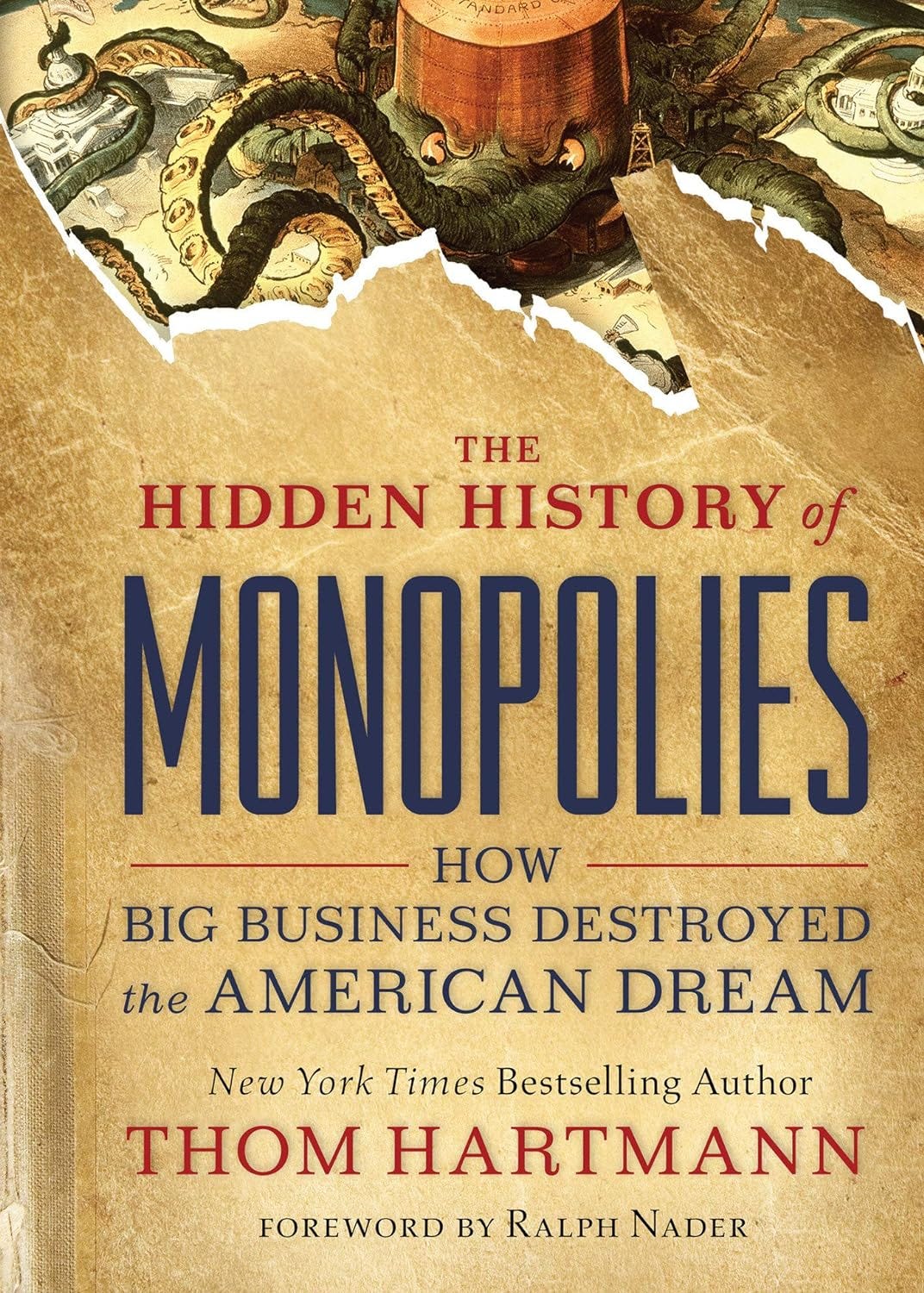Solution: Ban Preemption Laws Written by Corporations
Your weekly excerpt from one of my books. This week: "The Hidden History of Monopolies: How Big Business Destroyed the American Dream"

Solution: Ban Preemption Laws Written by Corporations
Corporations have successfully argued before the Supreme Court that they should have First Amendment rights of free speech, Fourth Amendment rights of privacy, Fifth Amendment protections against takings, and 14th Amendment rights as “persons” to “equal protection [with you and me] under the law,” among other “rights of personhood.”
It’s long past the time that these “persons,” when they become egregious and recidivist criminals (and particularly when they repeatedly kill people), be treated the same as human criminals: remove them from society permanently. New, smaller, more innovative companies can fill the spaces now occupied by bloated corporate criminals. The result will be (as it was after AT&T was broken up in the 1970s for violating anti-monopoly laws) an explosion of innovation, com- petition, and opportunity.
If enough corporate criminals are targeted, the American business renaissance could spread across industries including media, pharma, airlines, tech, banking, insurance, food, chemicals, oil, and beyond.75 It would be a real stimulus, meaningful and long-lasting: it’s time for our states to start enforcing the corporate death penalty.
Preemption is a legal doctrine whereby superior government bodies may make rules that inferior (smaller) governments must follow or may not violate. A state, for example, can pass a law forbidding any of its towns or rural communities from banning fracking or giant hog farms.
Preemption essentially strips democracy away from communities; British preemption of colonial American laws is one of the main reasons why the Revolutionary War was fought and is heavily cited in the Declaration of Independence.
Federal preemption is why marijuana is still technically illegal in the states that have legalized it: it’s still federally illegal, and federal agents can arrest you (as of this writing) even in states like Colorado and Oregon that have legalized it. The Constitution requires that federal law will almost always trump state laws: Article IV, Section 2, says that the Constitution and federal laws “shall be the supreme Law of the Land.”
Where this doctrine goes off the rails is most often at the state level, where corporations can less expensively buy off legislators to ban counties, cities, or towns from regulating corporate harms to their citizens. States have passed preemption laws that forbid local communities from banning everything from fracking to giant hog farms and toxic waste plants. Preemption laws have been passed across the nation to pre- vent local control of the tobacco, pesticide, fossil fuel, nuclear, firearms, and pharmaceutical industries, among others.
The leading organization fighting against this corporate abuse of governmental powers is the Community Environmental Legal Defense Fund, which helps local folks draft laws that challenge preemption and work to restore local democracy.76 CELDF’s website is rich with their work in this area, and they also put on educational seminars and offer the help of their lawyers to communities under corporate assault.
While the US Supreme Court, most notably in McCulloch v. Maryland (1819) and Pennsylvania v. Nelson (1956), has extensively defined the powers and limits of federal preemption of state laws, the power of states to block local democracy hasn’t been so well defined.
The golden era of state preemption laws began in 2010. In January of that election year, the US Supreme Court, in Citizens United v. FEC, overturned a century of good-government laws and ruled that virtually unlimited corporate (and billionaire) money could rain into the political process.
A few weeks later, in his State of the Union address, President Barack Obama said, “With all due deference to separation of powers, last week the Supreme Court reversed a century of law that I believe will open the floodgates for special interests—including foreign corporations—to spend without limit in our elections.”
He was right, and, as in 1979 after the Supreme Court first legalized corporate bribery of politicians in its 1978 First National Bank of Boston v. Bellotti decision, the rest of 2010 and 2011 saw a geyser of corporate money flowing into state elections, with the GOP picking up 675 state legislative seats, nearly doubling their control of state legislatures (25, up from 14 in 2009), and seizing total control (House, Senate, gover- nor) of fully 21 states.
Forty-three states have now passed laws forbidding cities from regulating gun ownership, 44 have passed laws prohibiting cities from regulating Uber or Lyft, 25 have blocked cities from raising their minimum wages, and 20 have made it illegal for a town or county to make low-cost high-speed internet service available to their citizens.77
Continuing the trend, in 2019, when the City Council of San Antonio, Texas, voted to kick Chick-fil-A out of their airport because of the company’s anti-LGBTQ discriminatory hiring policies, the Texas Legislature passed a preemption law overturning the city’s decision and banning any other city from doing the same. That year also saw the majority of preemption legislation submitted at the state level banning so-called sanctuary cities, guaranteeing a steady flow of cash to private prison contractors.78
While the real cancer here is a series of Supreme Court decisions, from Buckley v. Valeo to Citizens United to McConnell v. FEC, which need to be overturned (the subject of my book The Hidden History of the Supreme Court and the Betrayal of America), federal legislation to limit state preemption laws passed purely to benefit corporate interests is needed immediately.


